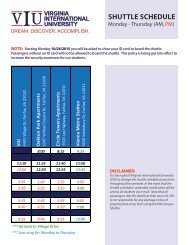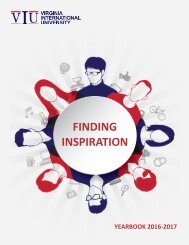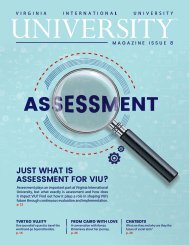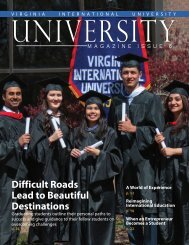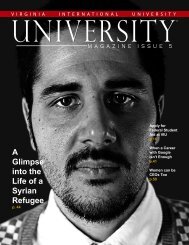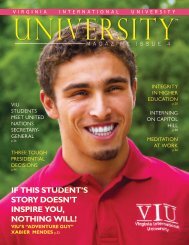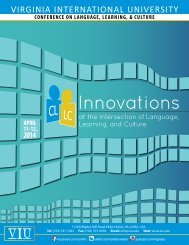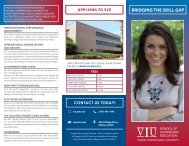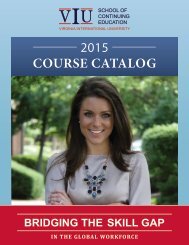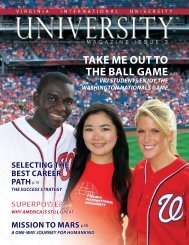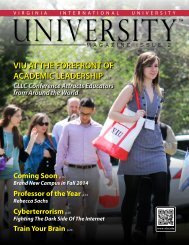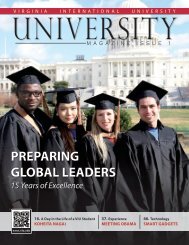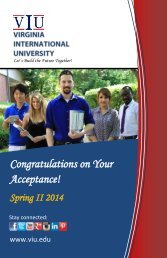UNIVERSITY
You also want an ePaper? Increase the reach of your titles
YUMPU automatically turns print PDFs into web optimized ePapers that Google loves.
Inaugural Conference<br />
viu.edu<br />
VIU at the Forefront of Academic<br />
CLLC Conference Attracts Educators from Around the World<br />
Leadership<br />
VIRGINIA INTERNATIONAL <strong>UNIVERSITY</strong><br />
Conference on<br />
Language, Learning, and Culture<br />
About the Participants<br />
With well over 200 participants<br />
from all around the world, the inaugural<br />
Conference on Language, Learning, &<br />
Culture (CLLC), organized by the VIU<br />
School of Education, was a major success.<br />
Attendees represented institutions from<br />
four continents including North America,<br />
South America, Africa, and Asia; the<br />
CLLC additionally hosted teacher-practitioners,<br />
researchers, business leaders, and<br />
community services from over 70 organizations.<br />
The 2014 theme, “Innovations at<br />
the Intersection of Language, Learning,<br />
and Culture,” sought to frame educational<br />
experiences as ideally meeting the needs<br />
of diverse students, their communities,<br />
and the various stakeholders who can benefit<br />
from high-quality, socially responsive<br />
language programs.<br />
“The speakers were what most attracted<br />
me to this conference. It is remarkable<br />
that the CLLC was able to attract such<br />
renowned and sought-after speakers its<br />
very first year,” said one participant. The<br />
event kicked off with a keynote address<br />
by Dr. Ken Petersen, Technical Director<br />
for Online Learning and Assessment for<br />
American Councils for International Education.<br />
Dr. Petersen provided insight into<br />
how technology is currently used in the<br />
classroom and the direction that the field<br />
of education is moving. He observed that<br />
today’s classrooms need to meet the needs<br />
of learners when, where, and how they<br />
currently participate in society. His call to<br />
action urges that teachers connect to the<br />
technology their students are already using.<br />
Dr. Petersen demonstrated that the<br />
field of education and language teaching<br />
needs to keep pace with the technology at<br />
hand.<br />
After the first keynote address, participants<br />
broke out into paper sessions<br />
and workshops. Since the conference was<br />
organized around four relevant strands in<br />
the field of language learning, there were<br />
a variety of fascinating presentations. The<br />
strands included: language learning and<br />
development; pedagogical considerations;<br />
program evaluation and policy; and language<br />
in society. Session topics as diverse<br />
as a psycholinguistic approach to second<br />
language learning to using Mariachi as<br />
pedagogy attracted participants and engendered<br />
much lively discussion.<br />
It is remarkable that the<br />
CLLC was able to attract<br />
such renowned and<br />
sought-after speakers its<br />
very first year.<br />
Following the first set of sessions, Dr.<br />
Shelley Wong, a professor at George Mason<br />
University and past TESOL president,<br />
addressed the audience. With a critical<br />
focus on inclusion in the classroom, Dr.<br />
Wong’s talk was centered on the rights of<br />
students in our classrooms. She urged that<br />
the call to social action and social responsibility<br />
around the issue of immigration<br />
rights is a key responsibility of teachers,<br />
policy makers, and the US government.<br />
She also stressed that the key issue in improving<br />
communities as a whole is ensuring<br />
that all students are able to receive an<br />
education and improve their lives.<br />
The later sessions included several<br />
workshops, including one by VIU’s own<br />
Dr. Marietta Bradinova on non-verbal<br />
communication and cross-cultural differences.<br />
Dr. Bradinova started off her<br />
workshop by having attendees think about<br />
whether certain non-verbal signals were<br />
appropriate in their cultures or not. Nodding<br />
her head, she asked “does this mean<br />
‘yes’ or ‘no’?” Conflicting responses from<br />
across the room led participants to the<br />
first of many signals that differ across cultures<br />
and continents. In small discussion<br />
groups, participants worked out a practical<br />
approach to solving cross-cultural<br />
communication challenges. “This is the<br />
best communication workshop I have ever<br />
attended,” commented a smiling participant<br />
from the southern United States to a<br />
colleague from Canada, as both walked to<br />
their next workshop.<br />
The 2014 CLLC ended with a keynote<br />
address by Dr. Terrence G. Wiley, President<br />
and CEO of the Center for Applied<br />
Linguistics. As a guiding light in the fields<br />
of education and linguistics, Dr. Wiley<br />
framed the discussion around focusing on<br />
priorities in language education policies in<br />
the United States. In particular, he noted<br />
that the United States is a multilingual society<br />
built upon a long history of immigration,<br />
a fact which is often missed in a narrative<br />
around “English only” policy and<br />
thought. This discussion demonstrated<br />
that the US is a diverse society in which<br />
various languages color and enhance the<br />
multicultural tapestry that is at its core.<br />
The conference received much positive<br />
feedback from its many participants.<br />
VIU Vice President of Academic Affairs,<br />
Ms. Badamsukh Yadamsuren, noted, “This<br />
conference has impacted so many people<br />
on such a wide scale, within several different<br />
academic areas. I am especially impressed<br />
by how many people traveled from<br />
such great distances.” Participants praised<br />
the quality of speakers, the highly relevant<br />
topics, and the interesting strands of CLLC<br />
2014, which allowed for many fascinating<br />
papers, workshops, keynotes, and poster<br />
sessions. Many have written back stating<br />
that they have shared their newly-acquired<br />
knowledge with colleagues and are utilizing<br />
the best practices in their own teaching<br />
and research.<br />
“I am incredibly grateful for the support<br />
of my colleagues at VIU and across<br />
the globe,” beamed VIU School of Education<br />
Director and CLLC organizer Mr.<br />
Kevin Martin. “We could not have organized<br />
this conference without them. The<br />
event was completely sold out, and we already<br />
have a lot of interest in next year’s<br />
topic. We are excited to grow and expand<br />
in 2015!”<br />
30% Foreign<br />
70% North American<br />
North American Locations<br />
Canada, Maine, Mississippi,<br />
California, Missouri, Texas, New<br />
York, New Jersey, North Carolina,<br />
and Pennsylvania, Virginia,<br />
Maryland, Washington, DC<br />
Affiliations<br />
Participants were affiliated with: Georgetown University,<br />
George Mason University, American University, Center for Applied<br />
Linguistics, Fayetteville State University, CUNY, Florida<br />
International University, ICLS, Mentora College, SUNY, Literacy<br />
Council of Montgomery County, Literacy Council of NOVA, Old<br />
Dominion University, Qatar University, Northern Virginia Community<br />
College, the Global Language Network, University of<br />
Pennsylvania, Trinity University Washington, UMASS, University<br />
of Maryland, and Texas A&M University, among others.<br />
30 University Magazine, VIU Summer 2014<br />
Summer 2014 University Magazine, VIU 31




